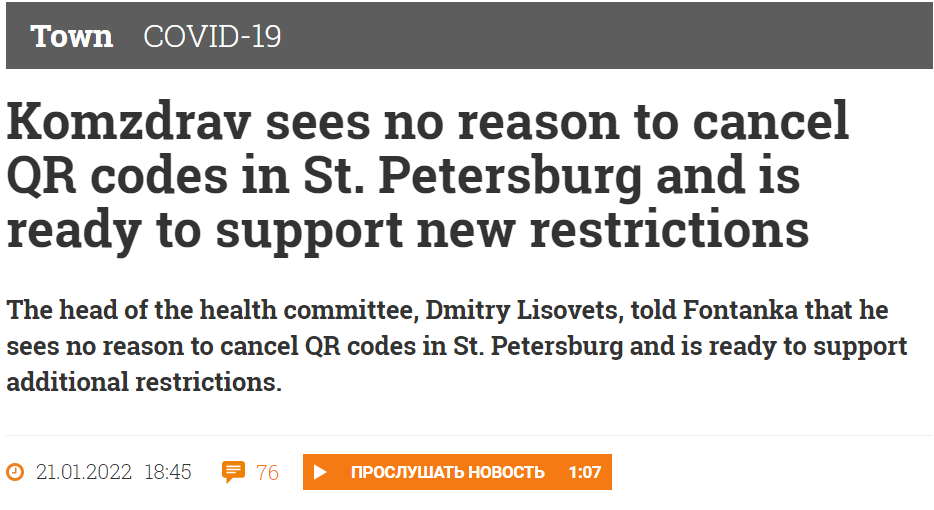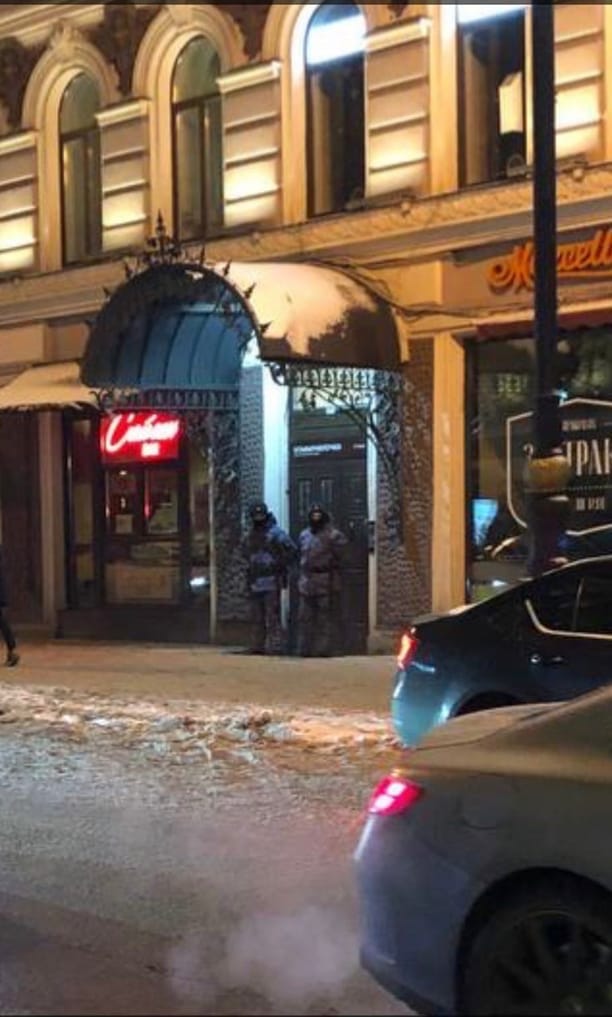By Riley Waggaman, a former “senior editor” (newsroom errand boy) at RT
“There is now a major nation that has essentially given up on anti-COVID measures,” Strategic Culture Foundation announced on January 21. Which major nation? Russia. This is very exciting news. But is it true?
Last week the State Duma abandoned legislative efforts to create a national QR code system in Russia. While undoubtedly a victory for the Russian people—the vast majority of whom opposed this ridiculous and deeply anti-human legislation—the reality is that many millions of Russians are already living under “QR code apartheid” (to borrow an excellent phrase from Tim Kirby, the author of the SCF article in question).
In fact, on November 1, TASS reported all 85 federal subjects of Russia had some form of QR code system in place.

Over the past three months some regions have scaled back their QR code regimes, while other parts of the country (St. Petersburg and Tatarstan being the two obvious examples) have made digital “health” IDs mandatory for the most mundane tasks and activities. Enforcement is also highly mercurial: in Russia, widespread noncompliance has slowed down the normalization of QR codes and other “public health” measures that have been almost joyously adopted in other parts of the world.
The national QR code legislation would have—at least in theory—standardized the QR systems already in place across Russia. We suspect enforcement would have also become more uniform.
Are QR codes really “dead” in Russia?
Kirby’s article (“QR Codes Are Dead in Russia”) claims the defeat of the national QR code bill means Russia successfully avoided “QR madness” that “would have been vastly more devastating than all of Washington’s sanctions packages combined.”
But as we just established, “QR madness” is alive and well in Russia. This is just a fact. Russia’s second-largest city is fully under the QR code yoke. Does that not qualify as total madness?
Elsewhere in the article, Kirby writes Russia has “essentially given up on anti-COVID measures”—how exactly? This assertion cannot be reconciled with observable reality.
Look for yourself: Russia’s official COVID portal has a map of region-specific restrictions. Examine it at your leisure.
Allow us to share a few anecdotes about the alleged non-existence of QR codes and “anti-COVID” measures in Russia.
On the same day Kirby’s article was published, St. Petersburg’s public health chief doubled-down on the ctiy’s QR code system and said he was open to introducing even more stringent measures.
A day later, on January 22, a “large-scale raid” in St. Petersburg shut down several businesses that refused to comply with QR code requirements. Authorities even posted police at the entrances of some of these establishments to ensure they would be unable to reopen.
(The QR code system in St. Petersburg has met considerable resistance from business leaders; the city’s administration announced last week it would discuss the issue at a January 26 meeting. Could we see a major U-turn in the near future? It’s possible. If this happens, it will be thanks to the defiance and noncompliance of the Russian people. UPDATE: St. Petersburg is going to… impose more restrictions?)
Returning to January 21: on the same day Strategic Culture Foundation hailed Putin for “repeatedly reaffirm[ing] that vaccination is a personal choice,” 95 teachers and employees of educational institutions were suspended from work without pay in Yurga for refusing Russia’s unproven genetic injection.
Yes, Russia has compulsory vaccination. You wouldn’t know it if you only read Strategic Culture Foundation, though.
At the end of October, TASS reported all of Russia’s regions had adopted some form of mandatory vaccination. As far as we know, none of these decrees have been rescinded; if anything they have become more draconian. (Note: apparently Chukotka doesn’t have any mandatory injection rules on the books at the moment.)
Just like everywhere else in the world, millions of Russians have been coerced into participating in a depraved medical experiment with zero transparency. Despite the Russian government’s unwillingness to disclose basic data, there are many documented cases in which compulsory vaccination has ended in tragedy.
Kirby’s article makes no mention of any of this. Instead, he suggests the downfall of the national QR code bill could prompt a “wave of anti-vaxxer immigration” to Russia.
There is certainly a case to be made that Russia is a good option for someone trying to flee the Virus Taliban—but to state Putin “repeatedly reaffirm[ed] that vaccination is a personal choice” without explaining that these “reaffirmations” are not in any way representative of the actual reality in Russia… this is very puzzling to us.
Equally bizarre is Kirby’s claim that Putin saw QR codes as a “States’ Rights” issue—in other words, as a policy debate that should be decided at the regional level.
Actually, Putin publicly stated the exact opposite.
On December 17, TASS reported:
In speaking of the adoption of vaccination certificates, Putin noted that, contrary to expectations, he cannot announce that QR codes are unnecessary.
“I cannot end this on the note expected by certain social organizations and figures, taking into account both moral motivations and the duties of my office,” said the head of state, pointing to the continuing complications in the fight against coronavirus.
It’s possible he changed his mind. But after the national QR code law was shelved, Putin’s spokesman, Dmitry Peskov, suggested the legislation was superfluous because the regions were already taking care of business.
“There is no need for additional actions here, they will be carried out anyway,” Peskov said on January 17.
There’s a lot more that can be said on this subject; Marko Marjanović at Anti-Empire wrote a very thorough and thought-provoking response to Kirby’s analysis and we encourage everyone to read it.
The perilous state of “Russia analysis”
People have different views about Russia, its government—even Vladimir Putin. That’s completely normal and to be expected. It’s obvious Kirby is coming at a variety of Russia-related issues from a totally different angle than we are. Which is 100% okay and fine.
The problem is that undeniable, basic realities about COVID Russia continue to be ignored, denied or blatantly misrepresented by Strategic Culture Foundation and a whole list of Russia-sympathetic “alternative media” outlets. Why are people doing this? It’s very, very weird.
Russia is one of the few countries where an obvious majority of people are opposed to vaccine mandates, QR codes and other deranged “public health” measures. Unfortunately, Russia’s regions—with the full support of the federal government—have pursued deeply unpopular, even suicidal policies that are hurting Putin and Russia’s socioeconomic stability. So if you are pro-Putin and pro-Russia, you should be concerned about this.
Is Putin completely surrounded by traitors? Because Russia’s federal government has repeatedly clapped and cheered for vaccine mandates and QR codes. Is Putin accountable for anything he or his government says or does?
If Putin is fighting behind the scenes to stop vaccine mandates and QR codes—a claim made by Kirby and many others—can someone please articulate how?
We have three simple questions for anyone who considers themselves a Russia-focused analyst, journalist, pundit, podcaster, Twitter troll—whatever:
1. Do the Russian people want QR codes? Yes or no?
2. Do the Russian people want Sputnik V? Yes or no?
3. Should the Russian government be held to the same standards as all other governments? Yes or no?
If you don’t know the very obvious answers to these three questions, there’s seriously zero hope for “Russia analysis.” Seriously: it’s over. Pack it up. We’re toast.
And yet, when we look around the (English language) Russophile media, almost nobody is stating the obvious. Why is that? It’s very peculiar.











The paymaster rings the bell:
The scrivener sings a sly, palsied tune –
Lies, tricks & half-truths pell-mell;
Evasion of reality jejeune.
Bonjour Riley,
Your work is just invaluable. I France there are two commentators of the Russian politic who are more nuanced than the STF about the real situation. I try as much as I can to make your contribution known by French researchers.
Take care